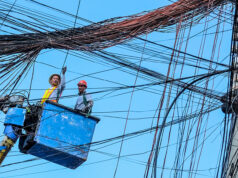PHL must leverage regional partners in post-pandemic era
THE PHILIPPINES will need to deftly navigate the US-China trade dispute during and after the pandemic, likely via increased regional cooperation, while also reassuring partners that its disease-containment efforts are effective, experts said.
Economists and business leaders delivered their assessments while discussing their expected scenarios for the post-pandemic trade landscape at the Management Association of the Philippines’ CEO conference Tuesday.
Jeffrey D. Sachs, director of the Sustainable Solutions Network, said ASEAN countries must cooperate and continue their trade relationships with China.
“The last thing that the world needs is a cold war between the US and China,” he said.
He said Indonesia and the Philippines are under the microscope because of their high COVID-19 (coronavirus disease 2019) case counts relative to the region, and should maximize their efforts to get the outbreak under control, including testing and contact tracing, while reopening trade within Asia and major partner economies.
“For that to happen, the Philippines and Indonesia will have to suppress the epidemic more than they have done until now,” he said.
Association of Southeast Asian Nations (ASEAN) Secretary-General Lim Jock Hoi said that the region must strive to keep its economies open even while trying to contain the pandemic.
“This is not just empty rhetoric. It is in fact a much-needed signaling that ASEAN will keep itself open and unfold the spirit of cooperation and partnership in the fight against the pandemic,” he said.
“Recognizing the impact of the pandemic, ASEAN has adopted an all-of-ASEAN community approach noting the fragmented sector-by-sector approach will not be effective.”
PwC UK Global Leader for Strategy and Leadership Blair H. Sheppard said economies have run into the same problems in recent years, including a growing disparity in prosperity, distrust in institutions, the threat posed by technology, and increased polarization of societies.
He said that it does not make sense for countries to focus on globalization before addressing local concerns.
“If we had a more sophisticated sense of globalization, maybe we should start with thinking about building local strength first and then interdependence locally, we’d have been better off,” he said.
Thierry Apoteker, TAC Economics Chairman and Chief Economist, said that US-China tensions significantly affect businesses subject to US sanctions.
“This is indeed creating huge management consequences for the next few years because companies have to ready themselves for these prominent tensions between the two competing powers,” he said.
Long-term trends have demonstrated that international trade has moved “too fast, too far,” he said, requiring a pause in international integration.
But he added that intra-Asian trade in the next few years is expected to be a dynamic element of global trade.
“Global trade will be rather flattish over the next few years, but the one thing that will not be flattish will be the regional Asia trade, and that includes Southeast Asia.”
BusinessWorld President and Chief Executive Officer Miguel G. Belmonte said many in the business sector are seeing unprecedented economic contraction which they were unprepared for.
“On the other hand, since the outbreak, we have also been witness to the collective and sustained effort of the business sector to get the economy and the nation moving,” he said. — Jenina P. Ibañez



